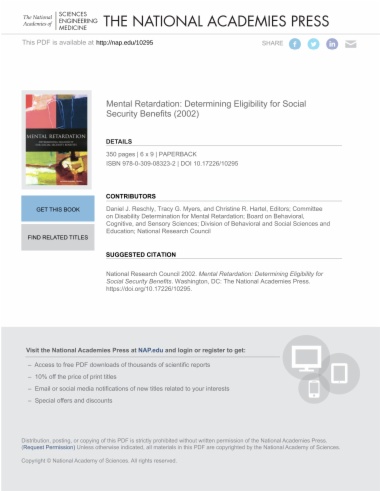Current estimates suggest that between one and three percent of people living in the United States will receive a diagnosis of mental retardation. Mental retardation, a condition characterized by deficits in intellectual capabilities and adaptive behavior, can be particularly hard to diagnose in the mild range of the disability. The U.S. Social Security Administration (SSA) provides income support and medical benefits to individuals with cognitive limitations who experience significant problems in their ability to perform work and may therefore be in need of governmental support. Addressing the concern that SSA's current procedures are consistent with current scientific and professional practices, this book evaluates the process used by SSA to determine eligibility for these benefits. It examines the adequacy of the SSA definition of mental retardation and its current procedures for assessing intellectual capabilities, discusses adaptive behavior and its assessment, advises on ways to combine intellectual and adaptive assessment to provide a complete profile of an individual's capabilities, and clarifies ways to differentiate mental retardation from other conditions.
- Cover
- Front Matter
- Executive Summary
- 1. Introduction
- 2. The Policy Context
- 3. The Role of Intellectual Assessment
- 4. The Role of Adaptive Behavior Assessment
- 5. The Relationship of Intelligence and Adaptive Behavior
- 6. Differential Diagnosis
- References
- Biographical Sketches
- Index

